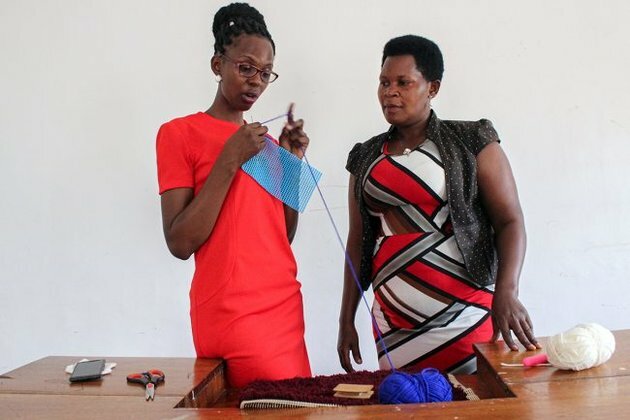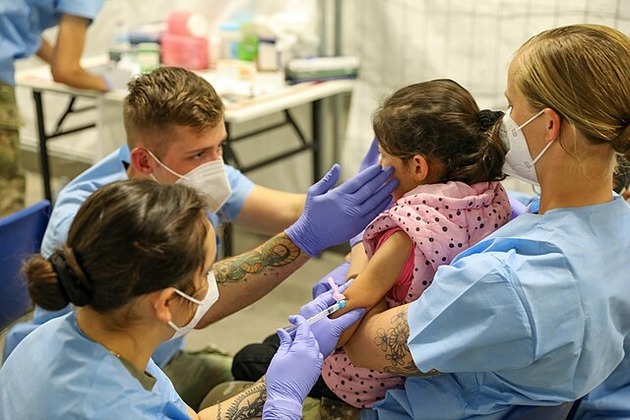The Price of a Carpet: Can Ugandan-Made Goods Compete With Imports?
Global Press Journal
13 Jun 2019, 05:04 GMT+10

Business The Price of a Carpet: Can Ugandan-Made Goods Compete With Imports? view team
In Uganda, locally-made goods are twice as expensive as imported ones. The government wants to promote Ugandan manufacturing as part of a strategy to meet international standards - but local people are concerned that their quality doesn't match their high price.
BOMBO, UGANDA - Cathy Nanyonjo has a ball of yarn, a piece of mesh fabric and a pair of scissors. These are the only three things she needs to make her shaggy carpets.
Even though Nanyonjo's carpets are simple, they're more expensive than the others found on the local market. One 80-by-150-centimeter (about 31-by-59-inch) carpet sells for 450,000 Ugandan shillings (about $120). That's more than two times the price of an imported Turkish carpet of the same size, she says.
"Sometimes it takes up to two weeks to finish a shaggy carpet, this is why the pricing is quite high compared to imported carpets," she says.
Still, Nanyonjo says she sells at least four carpets each month. She says her customers understand why they're priced as high as they are.
"They understand the effort that goes into crafting each piece," she explains. "The mats are soft and luxurious, and they provide a certain form of comfort."
Joseph Lubega moves carpets in his shop in Bombo, in central Uganda. The rugs and carpets in Lubega's shop are imported. They're not as expensive as rugs that are made in Uganda.
Patricia Lindrio, GPJ Uganda
Nanyonjo started making shaggy carpets in 2017, three years after the Ugandan government rolled out its Buy Uganda Build Uganda policy. The policy aimed to promote the consumption of locally produced goods and services, as well as improve their quality.
In the 2017-18 fiscal year, the Uganda National Bureau of Standards (UNBS) destroyed billions of shillings worth of substandard goods, some imports and some locally manufactured. According to authorities, these goods were harmful to the well-being of consumers.
Now, local economic experts say a majority of Uganda's manufacturers and business owners are struggling to make and provide goods that meet UNBS safety and quality standards. There are exceptions, but even those manufacturers and craftspeople face stiff competition from businesses that sell cheap imports that, at first glance, might appear to be high quality.
And competition is growing. The Bank of Uganda recorded a 42% increase in formal private sector imports from 2007 to 2017.
To deal with this, Ugandan manufacturers are targeting Uganda's emerging middle class.
The middle class here has grown both in size and purchasing power, according to the Institute of Policy Research and Analysis in Kampala, Uganda's capital. In a 2012 study, the institute defined middle-class Ugandans as those who spent between 1 and 5 million shillings ($267 and $1,335) every month. In 1992-93, this group of people made up just 1% of the total population. By 2009-10, middle-class Ugandans made up 4.1% of the population. (More recent data was not readily available.)
Middle-class Ugandans, according to the report, normally work as civil servants, doctors, lawyers, or occupy mid-level positions at large companies and nonprofits.
The rise of a middle class in Uganda mirrors the country's aspirations to reach international standards of success. Uganda's leaders envision a Ugandan society transformed from a "predominantly peasant society to a modern and prosperous country" by 2040.
Now, to promote their own businesses, Ugandan manufacturers are pushing for a ban on imported goods, says Fred Muhumuza, an economist. Key products that those manufacturers produce include agricultural products, textiles and plastics.
But despite the push for Ugandan manufacturing, local producers fail quality standard checks, Muhumuza says.
"If Ugandan manufacturers want to compete favorably with imports, Uganda's strategy on manufacturing has not only got to look at infrastructure but also at how to revive the market," Muhumuza says. "How do you make sure people have incomes to support those same factories from the demand side?"
Like Nanyonjo, Esther Kaitesi has made shaggy carpets for four years. If more Ugandans bought homemade products like hers, instead of relying on imports, business would be better, Kaitesi says.
"The most disappointing thing with the Ugandan consumer is they do not believe in the quality of homemade products," she says.
UNBS spokesperson Godwin Muhwezi says his organization has a new approach to help local manufacturers: A distinctive mark regulation, which requires that all products covered by compulsory standards be certified with the UNBS distinctive mark - in the shape of a "Q" for quality - before they are allowed on the market.
"The distinctive mark is an assurance to the consumer that the product meets quality and safety standards and therefore safe for consumption or its use," Muhwezi says.
His hope is that consumers will feel confident buying goods, especially locally-made ones, once they see the UNBS mark.
Nanyonjo says she's optimistic that Ugandan demand for Ugandan-made products will grow. She's not required to use the distinctive mark from UNBS, but she's confident that people will see the quality of her work.
"Manufacturers have to create the demand by giving their customers value for their money," she says.
 Share
Share
 Tweet
Tweet
 Share
Share
 Flip
Flip
 Email
Email
Watch latest videos
Subscribe and Follow
Get a daily dose of Herald Globe news through our daily email, its complimentary and keeps you fully up to date with world and business news as well.
News RELEASES
Publish news of your business, community or sports group, personnel appointments, major event and more by submitting a news release to Herald Globe.
More InformationInternational
SectionNew Hampshire federal court ruling defies Trump’s citizenship move
CONCORD, New Hampshire: A federal judge in New Hampshire issued a crucial ruling on July 10 against President Donald Trump's executive...
Houthis attack cargo ship in Red Sea, raising maritime safety fears
DUBAI, U.A.E.: A cargo ship flagged under Liberia, known as the Eternity C, sank in the Red Sea following an attack executed by Yemen's...
Trump administration restarts Ukraine arms deliveries
WASHINGTON, D.C.: The Trump administration has started sending some weapons to Ukraine again, just a week after the Pentagon told officials...
From France’s shores, desperate migrants look to reach British coast
ECAULT BEACH, France: On clear days, the white cliffs of the United Kingdom, are visible from northern France, where men, women, and...
CDC: US records 1,288 measles cases, most since 1992 outbreak
ATLANTA, Georgia: The United States is facing its worst measles outbreak in more than three decades, with 1,288 confirmed cases so...
Gaza War sucking life out of an Israeli generation
In the past month alone, 23 Israeli soldiers have been killed in Gaza—three more than the number of remaining living hostages held...
Sports
SectionRomeo Force of Indian Army organises Cricket Premier League in J-K's Poonch
Poonch (Jammu and Kashmir) [India], July 13 (ANI): NY 49 RR of Romeo Force of the Indian Army organised the Cricket Premier League...
Brewers finding ways to win, while Nationals' struggles continue
(Photo credit: Jeff Hanisch-Imagn Images) The potential tying run had just reached base Saturday when Milwaukee Brewers third baseman...
Mets expect to have LHP Sean Manaea for series finale against Royals
(Photo credit: Kiyoshi Mio-Imagn Images) Left-hander Sean Manaea finally appears set to make his season debut for the New York Mets....
Astros fill in missing pieces in series against Rangers
(Photo credit: Thomas Shea-Imagn Images) It was fitting that the Astros had to dig deep into their reconfigured bench in the latter...
Guardians carry momentum into series finale vs. White Sox
(Photo credit: Patrick Gorski-Imagn Images) After hitting their season's low point a week ago, the Cleveland Guardians have reversed...
Reds look to beat Rockies, get Terry Francona 2,000th win
(Photo credit: David Richard-Imagn Images) In a span of 10 pitches Saturday, the Cincinnati Reds ensured they wouldn't be swept for...













